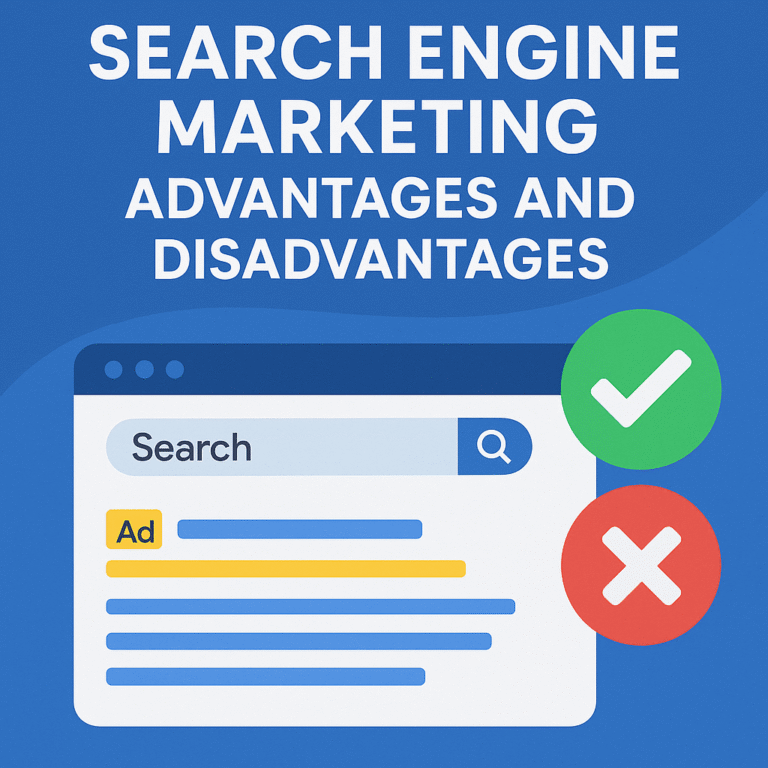
Search Engine Marketing: Advantages and Disadvantages (Complete Guide)
Search Engine Marketing (SEM) is one of the most effective ways to grow your business online. It allows advertisers to place their websites at the top of search engine results through paid ads. But while SEM has major benefits, it also comes with some downsides. In this guide, we’ll break down the search engine marketing advantages and disadvantages so you can make the best decision for your digital strategy.
What is Search Engine Marketing (SEM)?
SEM is a paid advertising strategy that displays your website on top of Google or Bing results for targeted keywords. Platforms like Google Ads let you pay for clicks, known as Pay-Per-Click (PPC). Unlike SEO, which grows traffic organically, SEM provides quick visibility through paid placements.
✅ Advantages of Search Engine Marketing
1. Instant Results
SEM delivers fast results. Once your ads are live, your website can appear at the top of search results within minutes. This is ideal for businesses launching a new product or running a time-sensitive campaign.
2. Highly Targeted Advertising
With SEM, you can target users based on location, device, time, and even intent. This precision helps you reach your ideal audience and boost conversion rates.
3. Budget Control
Set daily or monthly budgets to ensure you never overspend. You also have control over bidding and can scale campaigns based on performance.
4. Performance Tracking and Optimization
Google Ads provides detailed analytics. You can measure impressions, clicks, conversions, and ROI in real time—helping you optimize your campaign effectively.
5. Increases Brand Awareness
Even if users don’t click your ad, appearing in top search positions increases brand visibility and builds credibility in your niche.
❌ Disadvantages of Search Engine Marketing
1. High Cost in Competitive Niches
In industries like finance or law, keyword competition is fierce. This can drive up cost-per-click (CPC), making SEM less viable for small businesses.
2. Requires Ongoing Optimization
SEM isn’t passive. You need to monitor, test, and adjust your campaigns constantly to avoid ad fatigue and poor performance.
3. No Long-Term Value
Once you stop paying for ads, traffic stops. SEM doesn't build long-term visibility like SEO does. It’s effective but not sustainable alone.
4. Click Fraud Risk
Competitors or bots may click on your ads with no intention to convert, wasting your budget. Google combats this, but some risk remains.
5. Complex Learning Curve
SEM involves bidding, keyword match types, Quality Scores, and audience targeting. It can overwhelm beginners without proper training or support.
SEM vs SEO: Which One Is Better?
Both SEM and SEO are valuable, but they serve different purposes. SEM delivers instant traffic but requires budget. SEO takes time but offers long-term, free traffic. For best results, businesses should use SEO and SEM together.
Conclusion: Should You Use SEM?
Now that you understand the search engine marketing advantages and disadvantages, it’s clear SEM can be a game-changer—if used strategically. It’s perfect for immediate visibility, product launches, and testing new offers. But be prepared to optimize regularly and combine it with SEO for long-term growth.
Pro Tip: Work with an experienced digital marketing strategist to avoid costly mistakes and make the most of your ad budget.
- sharonkrajeev@gmail.comhttps://sharonrajeev.com/author/sharonkrajeevgmail-com/
